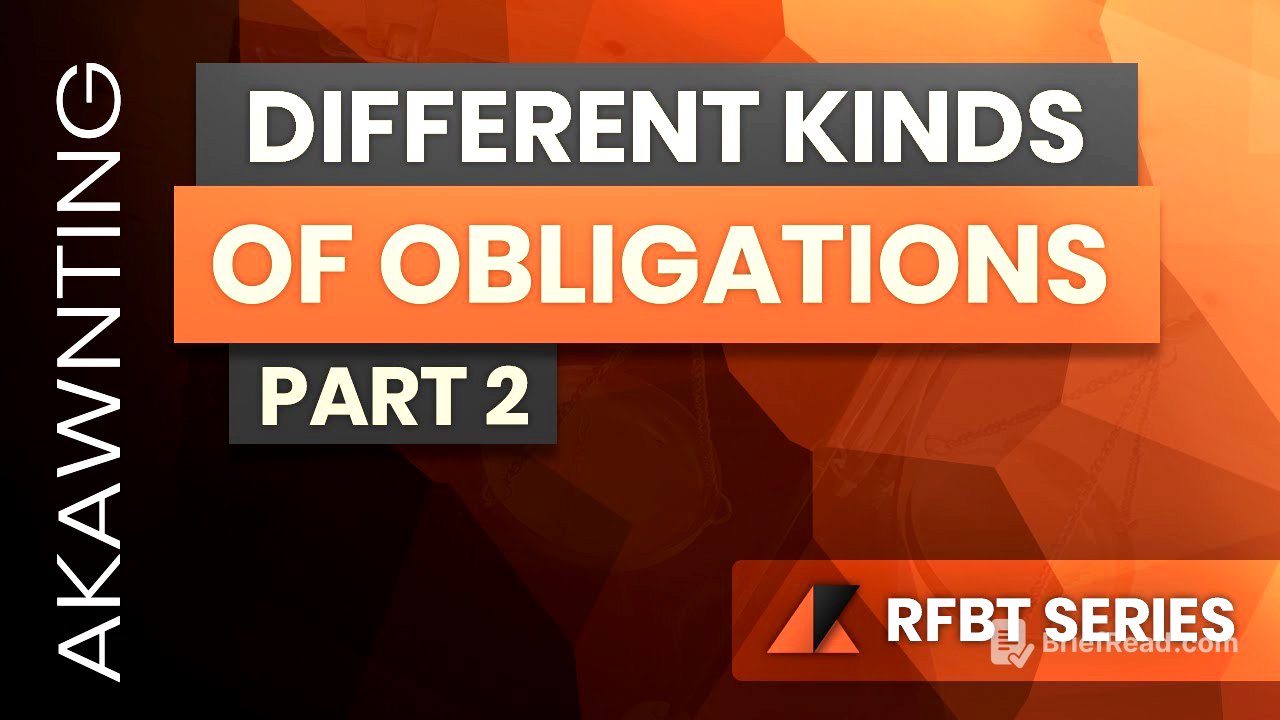TLDR;
This video, the second part of a series on different kinds of obligations under the Civil Code, focuses on pure and conditional obligations, as well as obligations with a period. It explains the distinctions between these types, their effects, and the rights and responsibilities they create.
- Pure obligations are demandable at once, while conditional obligations depend on future or uncertain events.
- Conditions can be suspensive (giving rise to an obligation) or resolutory (extinguishing an obligation).
- Obligations with a period have a fixed time for fulfillment, affecting only the demandability, not the existence, of the obligation.
Pure and Conditional Obligations: Introduction [2:26]
Article 1179 introduces pure and conditional obligations. A pure obligation is demandable at once because its performance doesn't depend on a future or uncertain event. A conditional obligation with a resolutory condition is also demandable at once, but its effects are subject to the happening of the condition. Pure obligations are not subject to any condition or period, making them immediately enforceable. Conditional obligations, however, depend on a condition that involves a future or uncertain event, or a past event unknown to both parties.
Examples of Pure and Conditional Obligations [4:51]
Kirito promising Alice a brand new laptop without any conditions is an example of a pure obligation, demandable immediately. However, if Kirito promises the laptop only if Alice passes her exam tomorrow, it becomes a conditional obligation. The obligation to give the laptop is dependent on Alice passing her exam, which is a future and uncertain event.
Article 1180 and Conditional Obligations [6:43]
Article 1180 states that when a debtor binds himself to pay when his means permit him to do so, the obligation is deemed to have a period, subject to Article 1197. Article 1181 explains that in conditional obligations, the acquisition or loss of rights depends on the happening of the event that constitutes the condition. Article 1182 states that if the fulfillment of a condition depends solely on the debtor's will, the conditional obligation is void. However, if it depends on chance or a third person's will, the obligation takes effect according to the code.
Classification of Conditions: Suspensive vs. Resolutory [9:10]
Conditions are classified based on their effect on the obligation and whose will they depend on. The first classification includes suspensive and resolutory conditions. Suspensive conditions cause the birth of the obligation, meaning the obligation only arises if the condition is met. Resolutory conditions cause the extinguishment of an existing obligation, meaning the obligation is effective until the condition is met, at which point it is extinguished.
Examples of Suspensive and Resolutory Conditions [12:30]
Taki promising Mitsuha a diamond ring if she graduates valedictorian is a suspensive condition. The obligation to give the ring only arises if Mitsuha graduates as valedictorian. Taki binding himself to shoulder Mitsuha's tuition until she graduates is a resolutory condition. The obligation to pay tuition exists until Mitsuha graduates, at which point the obligation is extinguished.
Classification of Conditions: Potestative, Casual, and Mixed [15:44]
Conditions are also classified as potestative, casual, or mixed, based on whose will they depend on. A potestative condition depends on the will of one of the parties (either the debtor or creditor). A casual condition depends on chance or the will of a third person. A mixed condition depends partly on the will of one of the parties and partly on chance or the will of a third person.
Examples of Potestative Conditions [18:32]
Kaneki obliging himself to give Touka a car if he goes to the mall tomorrow is a potestative condition dependent on the debtor's will. Kaneki obliging himself to shoulder Touka's living expenses until he wins is a resolutory potestative condition. However, Kaneki obliging himself to pay his debt to Touka when his means permit him to do so is not a conditional obligation but an obligation with a period. A potestative suspensive condition dependent on the debtor's will is void.
Potestative Conditions on the Part of the Creditor [24:20]
Kaneki obliging himself to give Touka a golden bracelet if Touka goes to the mall tomorrow is a potestative condition dependent on the creditor's will, which is valid. Kaneki letting Touka live under his house until Touka wants to go home is a resolutory potestative condition, also valid. Only potestative suspensive conditions dependent on the debtor's will are void.
Impossible Conditions: Types and Examples [25:56]
Impossible conditions are those that cannot be fulfilled, either physically or legally. Physically impossible conditions are impossible due to the laws of nature, such as flying to the moon without a vehicle or swimming across the Pacific Ocean. Legally impossible conditions are possible in nature but illegal due to being contrary to law, morals, good customs, public order, or public policy, such as killing someone or being the mistress of someone.
Illustrations of Impossible Conditions and Divisible Obligations [30:01]
If an obligation depends on an impossible condition, the obligation is void. However, if the obligation is divisible, the part not affected by the impossible condition remains valid. For example, if Natsu binds himself to give Lucy ₱10,000 if she wins an arm wrestling match against Asa, and an additional ₱5,000 if she seriously injures Asa's arm, only the condition regarding the injury is void, and the obligation to give ₱10,000 remains valid.
Positive and Negative Conditions [32:34]
A positive condition involves an event happening at a determinate time, while a negative condition involves an event not happening at a determinate time. For example, Bartra binding himself to give Elizabeth a LAN if she marries Willie Yoda within the year is a positive condition. Bartra binding himself to give Elizabeth a LAN if she does not marry Willie Yoda within the year is a negative condition.
Determinate Time and Fulfillment of Conditions [35:09]
If no time is fixed for a condition, it is deemed fulfilled at such time as may have been probably contemplated, considering the nature of the obligation. A condition is also deemed fulfilled when the obligor voluntarily prevents its fulfillment.
Examples of Conditions Deemed Fulfilled [40:47]
Bartra binding himself to give Elizabeth a LAN if she marries Willie Yoda when they are both ready to be a family has no fixed time, so the condition is deemed fulfilled when they are both reasonably ready. If Bartra drugs Elizabeth the night before the last day of the year to prevent her from marrying Willie Yoda, the condition is deemed fulfilled because Bartra voluntarily prevented its fulfillment.
Retroactive Effects of Suspensive Conditions [45:13]
When a suspensive condition is fulfilled, the effects of the obligation retroact to the day of the constitution of the obligation. However, in reciprocal obligations, the fruits and interests during the pendency of the condition are deemed mutually compensated. In unilateral obligations, the debtor appropriates the fruits and interests received, unless the intention was different. Obligations to do are determined by the courts on a case-by-case basis.
Examples of Retroactive Effects [47:25]
Taki promising Mitsuha a specific car if she graduates valedictorian, and she does so on April 11, 2019, means she is considered the owner of the car from January 1, 2019, the date of the promise. If Miyuki promises Tatsuya an apartment building if he passes the board exam on May 31, Tatsuya is considered the owner from January 1. However, Miyuki appropriates the rent from January 1 to May 31 because it is a unilateral obligation. If it were a reciprocal obligation, the fruits and interests would be deemed mutually compensated.
Rights of the Creditor and Debtor in a Conditional Obligation [56:18]
Before the fulfillment of the condition, the creditor may bring appropriate actions for the preservation of his right. The debtor may recover what he has paid by mistake in case of a suspensive condition. For example, if Oma promises Carla a specific dog for her birthday, Carla can take action to preserve the dog. If Carla pays Oma a debt before it is due, she can recover it with fruits and interests.
Rules in Case of Loss, Deterioration, or Improvement [1:00:10]
In suspensive conditions, if the thing is lost without the debtor's fault, the obligation is extinguished. If lost through the debtor's fault, he must pay damages. If the thing deteriorates without the debtor's fault, the creditor bears the impairment. If it deteriorates through the debtor's fault, the creditor can choose between rescission and fulfillment with damages. If the thing is improved by nature or time, the improvement benefits the creditor. If improved at the debtor's expense, he has the rights of a usufructuary.
Reciprocal Obligations and Breach of Contract [1:03:58]
In reciprocal obligations, the power to rescind is implied if one party does not comply with their obligations. The injured party can choose between fulfillment and rescission with damages. If both parties breach the obligation, the liability of the first infractor is tempered by the courts. If it cannot be determined who breached first, the obligation is extinguished, and both parties bear their own damages.
Obligations with a Period: Introduction [1:09:56]
Obligations with a period are demandable only when the day comes. Obligations with a resolutory period take effect at once. A period is a future and certain event, while a condition is an uncertain event. A period affects the demandability of the obligation, while a condition affects the existence of the obligation. Obligations with a period have no retroactive effect, unlike conditional obligations.
Comparison of Conditional Obligations and Obligations with a Period [1:11:55]
A suspensive condition dependent on the debtor's will makes the obligation void, while a suspensive period dependent on the debtor's will is still valid. A condition may refer to a future uncertain event or a past unknown event, while a period refers only to a future date certain. The rules regarding loss, deterioration, or improvement of the thing before the arrival of the day certain are the same as in conditional obligations.
Rights of the Debtor and Benefit of the Period [1:15:18]
Anything paid or delivered before the arrival of the period, the debtor being unaware of the period, may be recovered with fruits and interests. A period is presumed to have been established for the benefit of both the creditor and the debtor, unless it appears otherwise.
Loss of Benefit of the Period [1:18:28]
The debtor loses the right to make use of the period in several instances: when he becomes insolvent, when he does not furnish the promised guarantees or securities, when he impairs the guarantees or securities, when he violates any undertaking, or when he attempts to abscond.
When the Court May Fix the Period [1:23:57]
The court may fix the period if the obligation does not fix a period but from its nature and circumstances it can be inferred that a period was intended, or if the period depends upon the will of the debtor. Once fixed by the court, the period cannot be changed. If the debtor binds himself to pay when his means permit him to do so, it is an obligation with a period.









